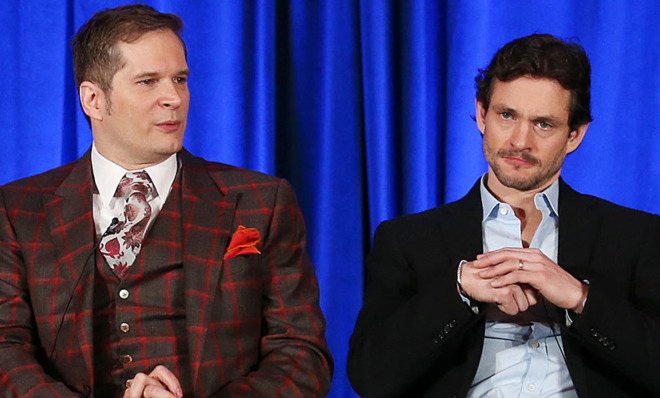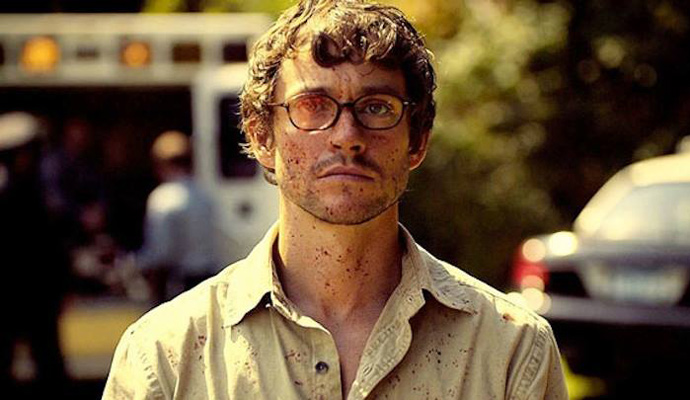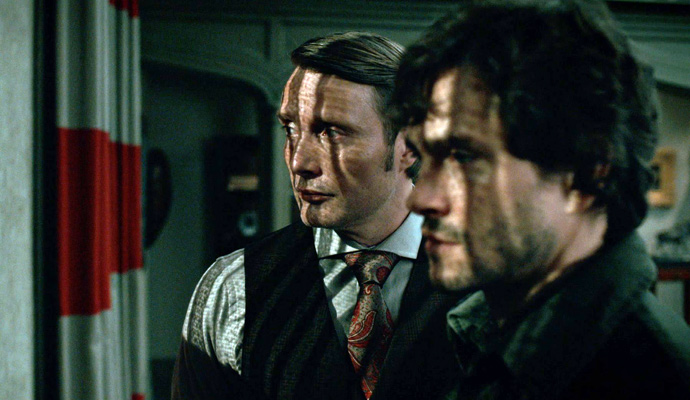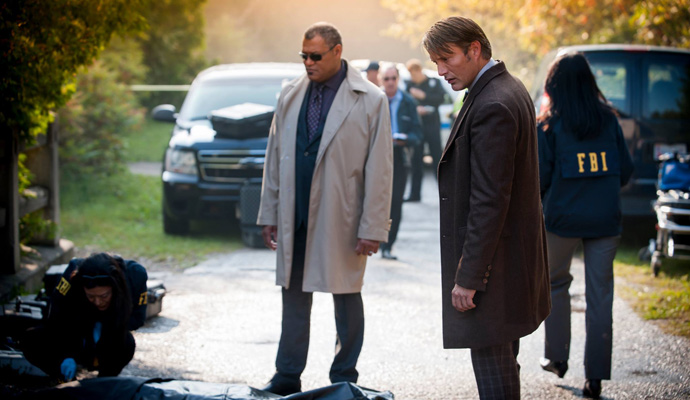An interview with Hannibal showrunner Bryan Fuller and star Hugh Dancy
The creative team behind NBC's critically beloved crime drama reflect on the first season and dish on the second

A free daily email with the biggest news stories of the day – and the best features from TheWeek.com
You are now subscribed
Your newsletter sign-up was successful
NBC's Hannibal was far from a ratings powerhouse in its freshman season. But it quickly established itself as one of the most visually and emotionally compelling dramas on television, achieving a level of aesthetic and narrative poise that one rarely finds outside of cable.
The show succeeds due to a combination of factors — chief among them the muscular central performances from Mads Mikkelsen, who plays the show's titular serial killer, and Hugh Dancy, who portrays Hannibal Lecter's embattled foil, FBI profiler Will Graham. They're anchored by a fascinating supporting cast that includes Laurence Fishburne as Will's overbearing boss, Jack Crawford; Caroline Dhavernas as Dr. Alana Bloom, a colleague of Hannibal's who also shares an ill-advised fondness for Will; and Lara Jean Chorostecki, who plays the unrelenting Freddie Lounds, a shameless tabloid journalist who has long suspected Will of being as dangerous as the killers he hunts.
Add to that the show's distinctively cinematic composition, disturbingly artistic crime scenes, and pitch black humor, and you have a series truly unlike anything currently on the small screen.
The Week
Escape your echo chamber. Get the facts behind the news, plus analysis from multiple perspectives.

Sign up for The Week's Free Newsletters
From our morning news briefing to a weekly Good News Newsletter, get the best of The Week delivered directly to your inbox.
From our morning news briefing to a weekly Good News Newsletter, get the best of The Week delivered directly to your inbox.
Season two premieres tonight, and it has seemed like an exceedingly long wait since last June's finale left us with Will Graham, not Hannibal Lecter, behind bars — accused of the same crimes that the cannibalistic psychopath elegantly carried out right under the FBI's nose.
I sat down with Dancy and creator Bryan Fuller back in July of last year at San Diego Comic-Con, where they were already well into the planning stages of season two. Fuller seemed to have a clear vision about where the series was heading, and he and Dancy were unmistakably enthusiastic about the direction of the show even before they commenced filming. In the (edited and condensed) transcript of our conversation below, the pair reflect on season one's story and share some insights into what we can expect from the new season.
Looking back at season one, how do you feel about it in hindsight, given all you accomplished?
Bryan Fuller: It's such a surreal experience, being shot out of the cannon for any kind of first season show. It all seems very dreamlike. I watch this show and I forget we made the show, which I think is a testament to the cast and the technical crew that put it together in such a lovely way. It's now, after the fact, very transportive. I see Hugh's performance and Mads' performance and Laurence's performance and all the rest of the cast, and I'm transported into the story. So I forget that I even worked on the show.
A free daily email with the biggest news stories of the day – and the best features from TheWeek.com
Hugh Dancy: Funny enough, I feel a bit like that as well. And it may be that we're just two imposters. [Laughs.] But looking back on it now, what I'm struck by is how closely Bryan achieved everything that he promised he would when we first sat down, which was in maybe May or April [of 2012]. We had a half-hour conversation, and he broke down the last season and the upcoming season beyond that. And then I'm there at the end watching it, and thinking, "God, he wasn't bullshitting."
Bryan, I know you've talked about having a seven-season arc planned out. In terms of season two, how much are you drawing from the mythology of the books and how much are you aiming to go your own route?
Fuller: We've taken a lot from Red Dragon, and used even sentences out of context to kind of thread the DNA of Thomas Harris into our series. And now, we are in completely uncharted territory. So that's very exciting, because now it's a purely original story with seeds of things that you found in the book.
We know in the book that Will Graham had a psychological breakdown after catching the Minnesota Shrike, which was [first season villain] Garret Jacob Hobbs. So we've seen that come to pass in an unexpected way. Now, we get to see a feistier, scrappier Will Graham who is no longer the unknowing victim. He's coming out swinging, which is really exciting. And we get to find our way back to Red Dragon over the next two seasons, somehow.
Season one was mostly serialized, but it had a few standalone cases in addition to the ongoing mystery. Will season two change the structure?
Fuller: The structure is definitely changing, but we are going to have those unique death tableaus and purple operatic murders that we saw in the first season, because that became the signature of the show. We definitely want to embrace that in the second season, but in a way that you wouldn't necessarily expect from seeing the first season. So we will have those pieces. Perhaps not as frequently as we did in the first season — primarily it's a serialized story of "what's Will Graham going to do next?"

I was fascinated when I heard that Mads Mikkelsen actually approached the character of Hannibal from the perspective that he's not truly human, but Satan in human form. What was your take on that, and did it affect how you both related to Hannibal as a character?
Fuller: I love that layer. It was one of the first things that Mads brought up in our initial meeting: "I don't see him as the character that you saw in the movies. I see him as Satan, and he is here to enhance humanity as well as destroy humanity, when humanity has it coming." As somebody who loves science fiction or fantasy, I love that mythological element of the show. But it's also important for me to make sure that it's also grounded in reality, that he is a man and he is also Satan. So there are things like, "How did he get that ear in Will Graham's stomach?" And we'll be answering some of those things very early on in season two.
Hugh, when did you finally feel like you had a sense of who Will Graham was as a character? Was there a specific moment when it clicked for you, when you felt like you were truly inhabiting him, or was it on the page from the start?
Fuller: It was on the page!
Dancy: [Laughs.] It was on the page, but that doesn't mean that you see it necessarily, which takes us all a while. The whole universe was pretty new to me. But I would say it was in preparation and when we started filming the first episode, in conversation with Bryan and with [director] David Slade, and working out Will's particular pathology. There's a scene in the first episode when Laurence and I have a little confrontation in the men's bathroom — the famous "use the ladies' room" scene. And I said to Laurence as we started, "I need to get to this place, and if you could push me…" And he said, "Okay, give me 10 minutes." And then came back in and scared the living crap out of me and everybody else on the set. I realized how far we could push the emotion of those characters within the framework of a detective scenario. And then I thought, "Okay, I have a feeling for where we're going."
Your performance is so intense — it's sometimes agonizing to watch Will struggling with all the odds stacked against him. How much do you bring that home with you, and what's your process like in playing him?
Dancy: Before we started shooting, I first went to Red Dragon, which is a remarkable book, and a remarkable blueprint for a particular character. So that's where I started. Then, behind that there's a whole raft of literature, which I think Thomas Harris went to as well, the behavioral science stuff, which was fascinating. And there was a point there where I started reading about serial killers, and I just had to stop, because that I found, at a certain point, was more grim than it was helpful.
But once we were shooting, the satisfaction of getting these scripts, loving them, having such good work to do, with such great actors, far outweighs any negative side. So you go home and you have a beer and you feel great.

In season two, Will's world has shrunk immeasurably, since he's no longer able to lean on the people he counted on last season. In terms of those core relationships with Jack and Alana and Hannibal, can you talk about how those dynamics have shifted?
Fuller: I think everything has shifted. We're caring about how Jack feels about Hannibal and how Jack feels about Will, the confusion that he has between these two gentlemen who are going to be in a bit of a spat. And how that affects other characters in the piece is interesting; to see how, at the very beginning of the [first] season, Alana Bloom was telling Jack Crawford, "Don't do this, and if I have to write a report on you, it wouldn't look good." And we're going to see that threat come to fruition and how it affects everybody in the piece in a very distinct way. So relationships are now off-kilter.
But there is a central friendship between Hannibal and Jack Crawford this time around that we saw between Will and Hannibal, because Jack Crawford still has scales over his eyes. So that has changed things. And who does Jack believe, and who does Will see as his ally, and who can he trust, and who can't he trust in this scenario? So a lot of the fun is taking the dynamics of the first season and completely turning them on their ears.
Gillian Anderson had a small but integral role as Hannibal's therapist, Dr. Bedelia Du Maurier, in season one. She's obviously got a number of other commitments, including a regular role on NBC's Crisis and the second season of British drama The Fall. Will we be seeing much of her in season two?
Fuller: Oh, yeah. I've talked to Gillian about that quite a bit and she's very dedicated to the show. She's made it very clear that she is invested in Hannibal and wants to come back. And we want her as much as she can come and play with us. I want to get scenes with Gillian and Hugh, because we end the season with her essentially calling Hannibal out a little bit. So that's got to be told, that story.

What can we expect from Freddie Lounds in season two?
Fuller: She will be coming back with a vengeance, because from her point of view, Will Graham — who she's been saying all along is an intelligent psychopath — murdered a young woman that she was actually getting very close to [Abigail Hobbs]. So she's going to have a very interesting journey.
The visual style of the show is so distinct from anything else on TV. Bryan, is that something that you envisioned from the start, or is that something that David Slade brought to it, or something you discovered on set?
Fuller: Well, it's really a collaboration between David and I. We both are very visual storytellers, and so I don't want to tell a story unless I can tell it cinematically. We never thought of this as a TV show; we always thought of it as 13 movies. So that's how we approached it.
Particularly the last episode, the finale that David directed and Jim [Hawkinson] was our cinematographer — so much of that was floating heads of darkness, and really elegant uses of light and darkness. So that's a motif for our show. We are talking about someone who is a pure, empathic human being who is light, and somebody who is so dark in their instincts and origin. That contrast between light and dark is very appropriately communicated by Jim Hawkinson.
Hugh, I was curious as to how you approached that revelatory scene in the season one finale when Will finally realizes the truth about Hannibal; what was going through his mind in that moment?
Dancy: The process of approaching the moment of revelation is a slow build, obviously. It's coming in the same way as the nightmares that Hannibal has implanted, I think, directly into Will's psyche from the first episode, and the growth of that stag motif, slowly, slowly in the back of Will's head — his nightmares correct themselves to slowly reveal the truth to him. So from my point of view, you can just allow that to take place in the imagery that Bryan's created and the way that David was shooting it. And the rest of it, for me, the real scary and upsetting moment is the simultaneous realization by Will that Hannibal has done this, these horrible things, and done it to him. And also that he has no motive. I think there's something so empty and terrifying about that. And that's a lot to recover from.
At the same time, I think that going into season two, going back to where we were talking about relationships, Will is now in a sense in a very pure place. His relationships were always compromised. His relationship with Jack is compromised. His relationship with Alana, even, is compromised. And in a sense that's just writ large now. But one question has been answered for him, which is the question to some degree of what he's capable of and the doubts that were in his mind. I think to some extent, a superhero has just become aware of his powers and actually being able to control them to some extent, whereas in the first season, he was at the mercy of them.

Hannibal's second season premieres on NBC tonight at 10 p.m. EST.
Laura Prudom is a freelance entertainment reporter, formerly of The Huffington Post, whose work has appeared on TV Fanatic, Moviefone, Vulture, and in the pages of Signature LA Direct magazine. A devourer of all things geek, she'll happily bore you with talk of Star Wars, Batman, and the underrated masterpiece that is Flash Gordon.
-
 Political cartoons for February 3
Political cartoons for February 3Cartoons Tuesday’s political cartoons include empty seats, the worst of the worst of bunnies, and more
-
 Trump’s Kennedy Center closure plan draws ire
Trump’s Kennedy Center closure plan draws ireSpeed Read Trump said he will close the center for two years for ‘renovations’
-
 Trump's ‘weaponization czar’ demoted at DOJ
Trump's ‘weaponization czar’ demoted at DOJSpeed Read Ed Martin lost his title as assistant attorney general